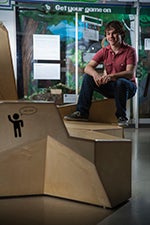Learn how this KI student’s love of video games is helping save the planet

For Knowledge Integration (KI) student Charlie Moscoe, things don’t get much better than spending time in the basement of the Ontario Science Centre rummaging through piles of material from obsolete exhibits.
“I grew up right around the corner from the Science Centre and I loved it,” Moscoe says. “I would go there maybe once a week and I knew that place front to back.” Today, he is one of 14 students in Knowledge Integration’s INTEG 475 “Real World Problem Solving,” class charged with creating an exhibit of their own at the Centre.
The project came about when organizers at the Science Centre approached KI’s professors after seeing the program’s third-year museum project. Science Centre staff were impressed by the convergence of disciplines, teaching methods and creative minds in an exhibition of topical, object-centric displays.
“When we got that invitation to make an exhibit, I was over the moon excited,” Moscoe explains. “They asked us to do an exhibit of citizen science video games.”
Citizen science video games are games that, as you play them, you are actually doing scientific research. They generally involve problems that computers aren’t good at (yet) and need creative flexible human minds to complete.
For example, manipulating the structure of proteins is helpful in the eradication of real world problems such as disease. However the process of “folding” these proteins is time consuming. If regular people are given the right tools to simplify the process and presented with the challenge in the form of a game (complete with high scores), they can do important scientific work. Think of it as crowd-sourced scientific research.
“The exhibit is about learning from video games. Video games have this rep of being a terrible mind-rotting waste of time,” Moscoe says. “Actually they can be a pretty powerful force for good.”
While the KI class won’t be inviting the thousands of guests to their exhibit to fold proteins, they will have three original interactive games that help players tackle important issues such as fighting a dragon to curb pollution.
Moscoe, who had a particular interest in these sorts of games long before the exhibit, is handling much of the computer and electronics side. Some students are tasked with web content and outreach to local educators, while others are physically building and setting up the exhibit.
Remarkably the students are achieving all of this with limited supervision from organizers at the Science Centre. “Basically they make sure we don’t burn anything down,” Moscoe jokes. “We do just about everything by consensus, often without a professor there.”
The level of coordination and teamwork is one of the hallmarks of the KI program, and helps fulfill its unofficial credo of creating students who are, “literate, numerate, articulate and play well with others.”
Just like the video games they are creating, the INTEG 475 project itself seems like important academic work disguised as play. This is clear as Moscoe discusses what it’s like to have free-run of his old childhood haunt.
“I ripped apart an old exhibit I had played with as a kid. They said we could salvage it for parts,” he says. “It was so cool. We asked them if they had all these different things. Like, we asked if they had a taxidermied jaguar. They said, ‘ummmm, no, but we have a taxidermied lynx!’”